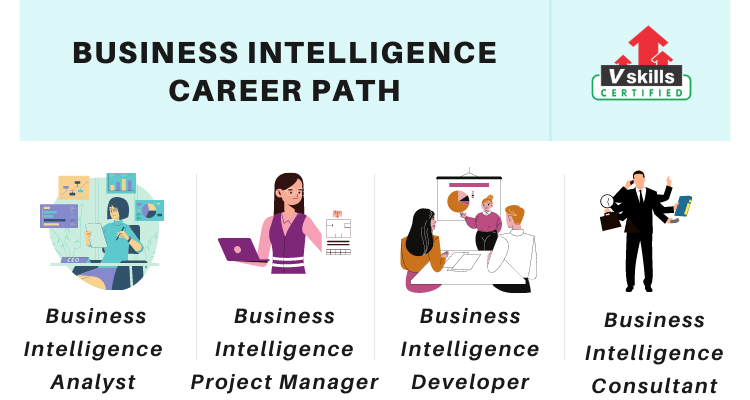Technology has advanced at a breakneck speed in recent years, enabling speedier procedures and bringing in massive amounts of data. And businesses are embracing business intelligence (BI), which uses software and services to turn data into actionable insights and assist them in making educated and tactical business decisions.
Let us know about BI Career Path!
Who is Business Intelligence Professionals?
Business Intelligence Professionals convert collected business data into accessible information so that business executives and stakeholders may make informed strategic decisions based on it. A BI Analyst analyses data to find sources of lost revenue and inefficiencies, then communicates that information with coworkers so that they can come up with solutions.
Typical Duties and Responsibilities
- Manage the specified reporting areas on a day-to-day basis and provide periodic reports.
- Assist in the development of data solutions for businesses.
- Develop BI reporting from executive dashboards to supervisor-level focused areas.
- Validate the data in the reports that have been created, and introduce the users to them.
- Conduct enterprise data solution data audits.
- Internal and external audits should be participated in and supported.
Career Options
Some of the career opportunities one can explore are –
- Business Intelligence Analyst – A business intelligence analyst’s job is to get a thorough grasp of business processes, production systems, data warehouses, and departmental databases. They collaborate in cross-functional teams to raise awareness of BI technologies and assist in the demonstration of BI solutions.
- Business Intelligence Project Manager – The overall success of reporting data deliverables is the primary job of a BI project manager. To build and deploy data warehouses, portals, and apps, these people collaborate with internal teams. They also identify business gaps and design solutions to fill them.
- Business Intelligence Developer – BI developers create relevant solutions that fulfil the needs of clients. They also provide ETL to help with data integration needs. A BI developer is also in charge of database applications in DB2, Oracle, or SQL Server.
- Business Intelligence Administrator – Database management solutions are used by BI administrators to find more efficient ways to harness data for analysis and display. Because BI systems assist businesses in making educated decisions, BI administrators are also in charge of creating standard and custom reports that summarise the data.
- Business Intelligence Consultant – BI consultants assist firms in learning new data management practises. Consultants help businesses increase their operational efficiency by improving existing software or implementing new systems.
Skills required in Business Intelligence
- Computer formulas, databases, models, and queries are all possible.
- Problems must be defined, data must be collected, facts must be established, and valid conclusions must be drawn.
- Working knowledge of ETL tools
- Report writing, corporate communications, and procedure manuals are all skills you’ll need.
- Ability to effectively deliver information to groups of management, clients, consumers, and the general public, as well as answer to questions
- To build practical but well-designed data visualisations in SSRS or Tableau, you’ll need a creative attitude.
Eligibility
This position requires a bachelor’s degree in finance, information technology, statistics, or data analysis, as well as 2 to 3 years of experience in the business intelligence industry.
1+ years of experience with SQL technologies such as SSRS, SSIS, and SQL Server; 3+ years of expertise with Microsoft Office, focusing on Excel and Access; and knowledge with one or more business intelligence tools such as Birst, Tableau, or similar products are greatly desirable.
Market Demand
Companies will rely more and more on employees who can assist them collect, access, and analyse data to help them strategize and become more efficient as they become more data-driven. Business Intelligence Analysts will be required to examine acquired data, establish data models, and discover business trends in order for organisations to formulate current-day plans.
The sector of business and management analysts is predicted to grow by 14 percent between 2018 and 2028, substantially faster than the national average, according to the US Bureau of Labor Statistics. On weekdays, a Business Intelligence Analyst’s normal work hours in an office setting are from 9 a.m. to 5 p.m.
Average Salary in Business Intelligence
By the end of 2021, the BI and analytics market is anticipated to be worth $26.50 billion. Furthermore, businesses that use business intelligence analytics are five times more likely to make faster, more informed decisions. According to the US Bureau of Labor Statistics, demand for trained analysts and managers will rise to 14% by 2026, with overall data professional need rising to 28% by 2020. This outperforms projections for nearly every other occupation.
Resources
Before you can become an expert in desired areas, you must first build a solid base. Before you can move on to practical teaching, you’ll need to have the right applied skills. To gain a full understanding of the domain, you can use the following tools:
- Firstly, Online Tutorials for Business Intelligence
- MBA in Business Intelligence or any other allied field
- Also, Certification Courses from verified sources such as Vskills, Coursera, Udemy and so on.
- In addition, Online communities
- Moreover, Blogs and study material from experts in this field and many more.
Here are some examples of how you can improve your abilities:
- Freelancing
- Internships
- Apprenticeship programs
The above steps will help you to get this domain started. It’s a long way to go, however. You can take an advanced course to reach a new level of skills.
Some resources offered by Vskills
Vskills offer Business Intelligence certification for all those interested in working in this field. This certification course covers the following topics –
- Integration
- Data Management
- OLAP (Online analytical processing)
- Dashboards
- Data Warehousing
- Data Analytics
- Value Proposition
- Requirement Assessment
- Design
- Implementation
- Post-Implementation
- Performance Measurement
- Advanced BI
Vskills also offers free practice tests and online tutorials to supplement the learning process. You can check them by clicking on the following links –
Discover the career opportunities and other prospects of career in Business Intelligence. Hurry up and start preparing now with Vskills.in!




